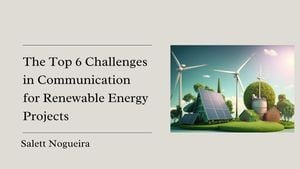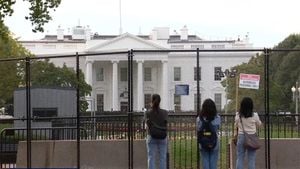Donald Trump’s recent reelection has sent waves of concern throughout the environmental policy community, signaling potential drastic shifts for the U.S. Environmental Protection Agency (EPA) and the country’s approach to climate change. Throughout his first term, Trump made headlines for rolling back numerous environmental regulations, favoring fossil fuel development, and prioritizing deregulation, all under the guise of promoting economic growth. Experts now fear these patterns will persist, if not intensify, during his second term.
From the outset of his presidency, Trump positioned himself as the champion of "energy dominance," with aspirations to transform the U.S. energy sector to become the world’s leading producer of oil, gas, and coal. Such ambitions led to significant compromises on environmental protection, exemplified by the administration's draconian cuts to EPA budgets and staffing. The agency has been restructured to favor industry, shifting focus away from stringent environmental regulations.
During his previous administration, Trump famously withdrew the U.S. from the Paris Climate Agreement and repealed the Clean Power Plan, which set forth emissions standards for power plants. His stance has always been clear: prioritization of energy production often overshadows concerns about climate change. Experts worry this disregard will escalate with Trump back at the helm. According to Sustainable Investments Institute Executive Director Heidi Welsh, Trump’s re-election could usher in more exemptions and rollbacks of environmental regulations. “Climate change risks will only be heightened by the U.S. deregulation,” Welsh cautioned, emphasizing the potential long-term financial repercussions for the markets.
Similarly, Christiana Figueres, who was instrumental in negotiating the Paris Agreement, expressed concerns about the global impact of Trump’s victory. While acknowledging it as “a major blow to global climate action,” Figueres remains optimistic about private sector initiatives to accelerate sustainability efforts, even if progress isn’t at the pace desired.
The outlook of leaders from the renewable energy sector is mixed. On one hand, there’s recognition of the continuing market momentum toward clean energy, driven by investor demand and international efforts to reduce emissions. On the other hand, the anticipated rollback of federal support could significantly hinder the renewable energy market. Many experts expect legislative measures supporting clean technology to falter under Trump’s leadership, compelling companies to fend for themselves.
The anticipated changes don't only pose risks for renewable energy; they could drastically alter the entire environmental regulatory framework. Staffing at the EPA is likely to take another hit, impacting the agency's functionality. Speculation abounds around potential hiring freezes and budget cuts reminiscent of those seen during Trump’s first term. Such reductions would undoubtedly cripple the EPA's ability to enforce compliance with existing regulations, hampering environmental assessments and significantly reducing effective monitoring of air and water quality.
A key aspect of Trump's environmental policy aims to shift responsibilities and power from federal to state governments. His previous administration often encouraged states to adopt less stringent environmental standards than those imposed at the federal level. A second Trump administration may take this decentralization even farther, empowering states to dilute protections even more significantly.
While some analysts anticipate legislative changes to the Inflation Reduction Act (IRA) may be less radical than Trump suggests, they do expect targeted adjustments to the law aimed at reducing federal support for renewable energy without fully repealing existing benefits. Many congressional Republicans appear to be cautiously supportive of clean energy, similar to trends seen during legislative processes like the bipartisan infrastructure law.
Despite the forecasts of doom and gloom, environmental experts do believe pressure will remain from consumers and investors demanding action on climate change. Even as Trump fights to kill the IRA and other existing climate safeguards, the unavoidable reality of worsening climate conditions continues to motivate stakeholders from the private sector to advocate for greater sustainability measures.
Continuing advances in renewable energy technologies and strong public support could serve as bulwarks against the wave of regulatory retreats anticipated under Trump’s presidency. Major corporations are likely to invest heavily irrespective of the political climate. The push for more climate-related disclosures, particularly from states like California and regulatory bodies within the European Union, could also bolster accountability and compliance among U.S.-based companies.
Experts predict the renewable sector, and other industries facing new regulations, will ramp up efforts to lobby and educate the Trump administration, emphasizing the economic benefits associated with clean technology and sustainable practices, hoping to open up lines of communication and bridge gaps between regulation and market needs.
Nonetheless, should Trump follow through with his vision, infrastructure focusing on traditional energy sources is bound to receive more backing than renewable initiatives. The country could witness relaxed standards for pollutants emanated by industries, leading to increased air and water quality issues. Trump's administration also stood on the side of the fossil fuel industry, focusing on relaxing rules specific to oil drilling and methane emissions.
Most alarmingly, indications show public health could suffer if tighter emissions standards decrease and monitoring of air and water quality diminishes. Relaxed regulations could lead to harmful pollutants infiltrate vulnerable communities near industrial sites, worsening health conditions and environmental justice inequities.
Experts and advocates are now imploring the public to stay engaged and vigilant against potential environmental rollbacks. With future climate action hanging by the thinnest of threads under Trump, advocacy for renewable energy and climate resilience will be more important than ever. The voices of industry, scientists, and concerned citizens must unite to counter the shifts threatening to unfurl years of carefully constructed environmental policies.



